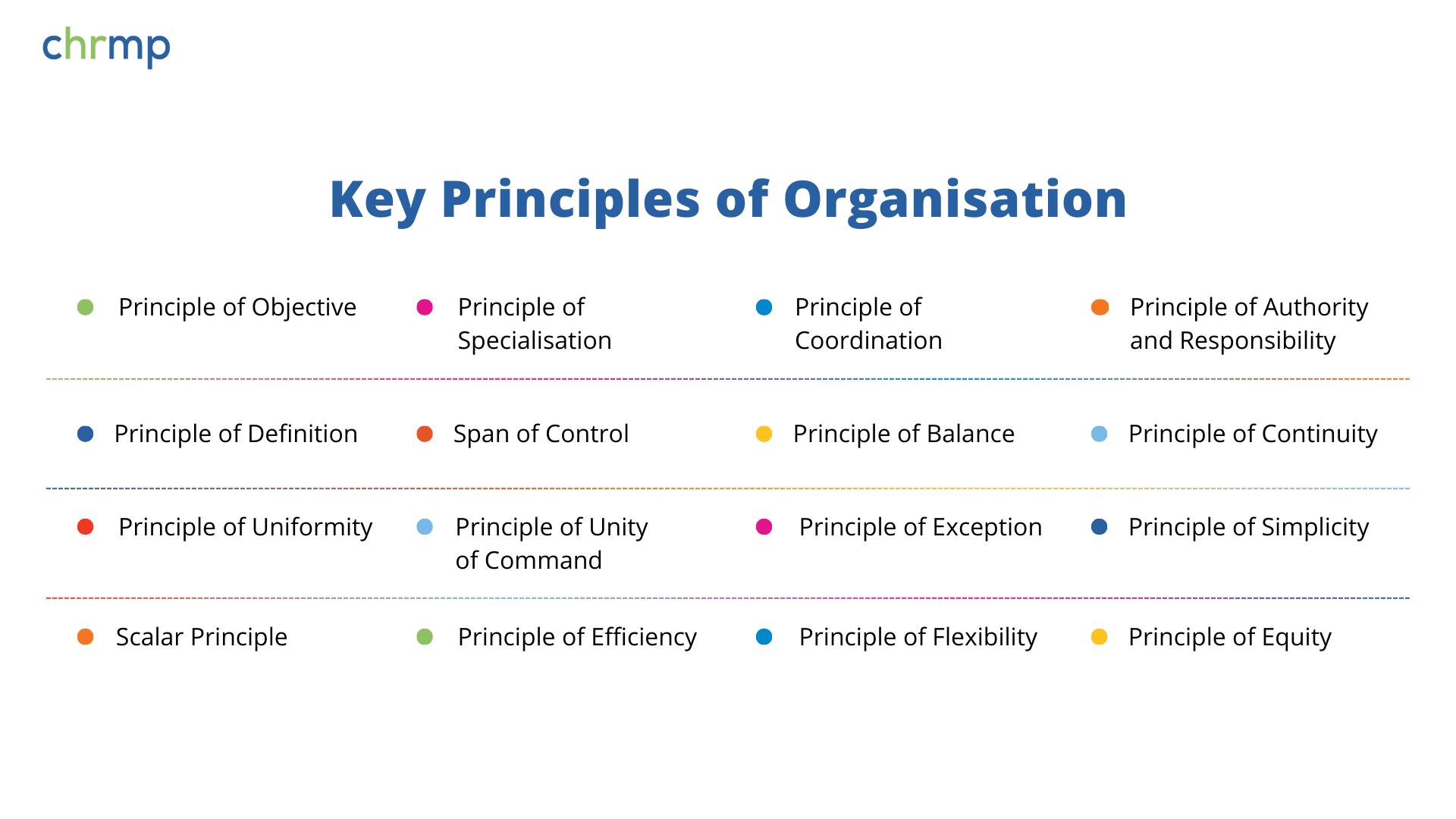

If you are running a business, managing a team, or pursuing personal goals, organising can help you achieve your objectives more effectively and efficiently. In this blog, we shall explore the 14 key Principles of Organisation and discuss each in detail.
By organising your resources, tasks, and time, stress can be reduced, productivity and performance can be enhanced, and greater heights of success can be achieved.
So without further ado, let’s dive into the principles of organisation and learn how to apply them to achieve your goals.
The fundamental guidelines and values that shape the organisation’s culture and decision-making processes are called organisation principles. These organisation principles define the mission and vision of the organisation, the strategic planning process, and the organizational structure.
The principles of organisation principles are essential for achieving the goals and objectives of the organisation efficiently and effectively.
By following the principles of organisation, companies can maintain a clear focus on their goals and work collaboratively to achieve them.
The principles of organisation provide a framework for decision-making, resource allocation, and operational processes.
|
Definition |
The principles of organisation are fundamental guidelines that define the structure, processes, and systems within an organisation to achieve efficiency, clarity, and alignment with goals. |
|
Importance |
– Establishes a clear organisational structure, reducing ambiguity and confusion. – Drives alignment between individual efforts and organisational goals. – Supports adaptability and resilience in dynamic business environments. |
|
Benefits |
– Enhances operational efficiency by streamlining workflows and eliminating redundancies. – Strengthens accountability and transparency in roles and decision-making. – Boosts employee motivation through equity and clarity. – Builds stakeholder trust and enhances organisational reputation. |
The principles of organisation are crucial because they provide a clear framework for decision-making, planning, and execution of tasks. They help establish a shared understanding of the organisation’s values, beliefs, and goals, guiding the behaviour and actions of its employees and management.

By adhering to these principles, the organisation can maintain consistency, efficiency, and effectiveness in its operations.
The principles of organisation enable the organisation to adapt to changes in the external environment, such as the expansion of business and the internal dynamics, as they provide a fundamental basis for evaluating and responding to new opportunities and challenges.
The principles of organisation are vital for achieving the organisation’s objectives, fostering a positive work culture, and promoting sustainable growth and success.
The key objectives of the principles of organisation are:
There are fourteen key principles of the organisation listed and discussed below one by one:

The principle of objective in an organisation is focused on setting clear and specific goals that align with the overall mission and vision of the organisation and those of the employees.
Objectives are specific, measurable, achievable, relevant, and time-bound (SMART), providing a roadmap for the organisation to navigate to achieve its desired outcomes.
By setting clear objectives, the organisation can provide a sense of direction and purpose for its employees and the HR managers, which helps to increase motivation and focus.
Objectives can be set at different levels of the organisation, from strategic to operational. They should percolate to all levels, thus ensuring alignment and consistency in pursuing the organisation’s goals.
Objectives should be reviewed and updated regularly to ensure they remain relevant and achievable in the changing internal and external environment and times.
Also Check: 25 Essential HR Policies for Every Organization in 2025
The principle of specialisation in an organisation is based on the concept that by dividing the work into smaller, more specialised tasks, the organisation can increase efficiency, productivity, and quality.
Specialisation involves assigning specific tasks and responsibilities to individuals or teams based on their skills, knowledge, and experience.
The specialisation can take different forms, such as functional specialisation, where each department is responsible for a specific function or process, called task specialisation, where each individual is assigned a specific task within a larger process.
The specialisation can also involve using technology and automation to perform routine or repetitive tasks within a larger process.
The principle of coordination in an organisation refers to aligning and synchronising the efforts of different individuals, teams, and departments and the management towards achieving common organisational goals and objectives.

Coordination involves planning, communication, collaboration and execution, which is essential for the effective functioning of the organisation.
There can be vertical coordination, where there is alignment and communication between different levels of the organisation’s hierarchy and horizontal coordination, called collaboration and communication between different departments or teams within the same level.
The principle of authority and responsibility in an organisation is based on the assumption that the corresponding responsibility for actions and decisions made under that authority comes with the assumption of authority.
This principle establishes a clear chain of command and ensures that each member of the organisation knows their role, responsibilities, and level of authority.
This way, there would be no room for conflict between hierarchical or horizontal levels, i.e. between different departments.
Authority refers to the power of making decisions and giving orders, while responsibility refers to the obligation to perform duties and be accountable for the outcomes.
The principle of authority and responsibility implies a clear alignment between the level of authority and responsibility to ensure that individuals are held accountable for their actions.
The principle of definition in an organisation is based on the concept that clarity and precision in defining tasks, roles, and responsibilities are essential for achieving efficiency, effectiveness, and accountability, thus reducing friction between different hierarchical levels or horizontal departments regarding the execution of tasks or authority.
The principle of definition involves defining tasks, roles, and responsibilities in a clear and specific manner, ensuring that everyone in the organisation understands their duties and knows what is expected of them.
Effective implementation of the principle of the definition requires a clear and concise organisational structure, with a clearly defined job description, performance expectations, and reporting lines.
The principle of definition is particularly important at the time of delegation of authority and assigning responsibility to do away with confusion, misunderstandings, friction or conflict.
The span of control is a principle in organisational management that refers to the number of employees or subordinates a supervisor or manager can effectively manage.
It determines the optimal number of employees that can be managed without compromising the quality of supervision or the efficiency of the organisation by any manager.
The optimal span of control depends on various factors, including the complexity and interdependence of the tasks being performed, the level of skill and experience of the employees, and the level of autonomy and decision-making authority granted to the employees.
Maintaining equilibrium and harmony among different elements within an organisation is of immense importance. This is what is referred to by the principle of Balance.
This principle recognises that an organisation comprises various stakeholders with different interests, needs, and perspectives, and it is essential to balance these elements to achieve organisational effectiveness and success.
The principle of balance involves ensuring a balance between employees’ needs, the organisation’s interests, and the expectations of external stakeholders such as customers, suppliers, and investors. It also involves balancing the organisation’s short-term and long-term goals, risks and rewards, and balancing individual and collective interests.
The principle of continuity in an organisation refers to maintaining stability, long-term sustainability and continuity.
This principle recognises that organizations operate in a dynamic and unpredictable business environment. It is essential to have a long-term vision for development and a proactive approach to managing risks and challenges.

The principle of continuity involves ensuring that the organisation is resilient and adaptable to changing circumstances, be it growth and expansion or management of risks and challenges, that it has a clear and compelling vision which guides its decisions and actions, and that it has effective strategies for managing risks and uncertainties.
The principle of Continuity also advocates developing a culture of continuous improvement and learning, where employees are encouraged to innovate, ideate, and experiment to drive the organisation to higher levels of success.
The principle of uniformity in an organisation refers to maintaining consistency and standardisation in how organisational processes and procedures are designed and implemented.
This principle recognises that consistency and standardisation can improve organisational efficiency, reduce errors and waste, and enhance product quality or service delivery.
A common set of rules, procedures, and standards have to be applied consistently across different parts of the organisation.
Unambiguous communication channels must be developed to ensure that everyone in the organisation understands these rules, procedures, and standards and applies them in their daily tasks.
Also Check: Employee Wellbeing: Health, Engagement & Retention Tips
Each employee receives instructions and direction from only one superior, or the manager reports to only one superior.
This principle recognises that a clear chain of command can improve organisational efficiency, reduce confusion, waste resources and duplication of efforts, and promote accountability.
The principle of unity of command advocates that each employee reports to only one supervisor or manager, who is responsible for directing their work and performance evaluation.
It also involves developing clear communication channels and protocols to ensure that instructions and feedback are delivered promptly, less chaotic and consistently.
Likewise, orders and feedback to and from many superiors would lead to an utterly confused employee, eventually translating into an ineffective and inefficient organisation.
The principle of exception in an organisation refers to the concept that management should unwaveringly focus on exceptional or unusual occurrences rather than routine or regular ones.
This principle recognises that an excessive focus on routine or minor issues can distract managers from addressing more critical matters.
The principle of exception involves establishing clear criteria for identifying exceptional situations or events that require management attention, such as major deviations from established standards, unexpected changes in market conditions, business cycles or maybe windfall profits.
It also involves delegating routine tasks and responsibilities to lower-level managers or employees so that top management can focus on more strategic and eminent issues.
The principle of simplicity in an organisation refers to the idea that systems, processes, and procedures should be simplified and broken down into smaller, more precise task units without sacrificing effectiveness or efficiency.
This principle recognises that overly complex systems and processes can lead to confusion, errors, and inefficiencies, making it difficult for employees to understand and follow established procedures.
Opportunities to streamline processes and eliminate unnecessary steps or procedures should be identified. It also involves designing systems and procedures that are easy to understand and follow, and that minimize the potential for errors, mistakes and duplication of effort and resources.
The concept of maximising productivity and minimising waste while utilising the available resources in the most judicious and economical manner is advocated by the Principle of Efficiency.
This principle recognises that achieving high levels of efficiency is essential for the success, sustainability and continuity of the organisation, as it allows the organisation to maximise output and minimise waste and costs.
The principle of efficiency involves identifying and eliminating activities that do not add value and finding ways to streamline processes and procedures to reduce the time, effort, and resources required to complete tasks.
It also involves ensuring that employees have the necessary tools, equipment, and training to perform their duties efficiently and effectively.
The scalar principle, also known as the principle of hierarchy, is a fundamental principle of organisational structure that involves the establishment of a clear chain of command, with authority and responsibility cascading from the top of the organisation down to the bottom.
According to the scalar principle, each individual within an organisation should have a clearly defined role, responsibility and level of authority, with higher-level positions possessing greater levels of authority and responsibility.
This creates a hierarchical structure, where decisions and directives flow down from those in positions of higher authority to those in positions of lower authority, and everyone is accountable for the decisions made by them and the tasks accomplished.
The principle of flexibility in an organisation acknowledges the need to adapt to changing environments, market dynamics, and internal challenges. It recognises that rigid systems and processes can hinder progress and limit the organisation’s ability to seize new opportunities.
Flexibility involves creating adaptable structures, policies, and procedures that can accommodate changes without disrupting overall operations. This principle encourages innovation, responsiveness, and resilience within the organisation. Leaders should empower employees to suggest improvements and embrace change, fostering a culture that values adaptability.
The principle of equity emphasizes fairness and justice in organisational practices, ensuring that all employees are treated with respect and impartiality. This principle advocates for equitable policies in hiring, promotion, compensation, and performance evaluations, free from discrimination or bias.
Equity fosters a sense of belonging and motivation among employees, as they feel valued and fairly treated. Organisations can achieve this by maintaining transparent processes, addressing grievances promptly, and regularly assessing practices to ensure they align with fairness and inclusivity.
Applying the principles of organisation offers several significant benefits that enhance the efficiency, effectiveness, and sustainability of an organisation. These benefits include:
The principles of organisation are foundational to the efficient functioning and long-term success of any organisation. Their significance lies in the following:
In conclusion, the principles of organisation are fundamental concepts that guide the design and operation of effective and efficient organisations.
By incorporating these principles into their operations, organisations can ensure that resources are used effectively, goals are achieved, and employees are engaged and motivated in their work.
Whether it is the principle of unity of command, the principle of span of control, the scalar principle, or any other principle, these concepts are essential for ensuring that organisations operate in a coordinated and effective manner.
As such, it is important for organisations to understand these principles and apply them in their daily operations to ensure their success in today’s competitive business environment.
The principles of organisation are a set of fundamental concepts that guide the design and operation of organisations. They include principles such as the unity of command, a span of control, the scalar principle, the principle of efficiency, the principle of balance, and the principle of continuity.
The principles of organisation are important because they provide a framework for designing and operating effective and efficient organisations. They help to ensure that organisational goals are achieved, resources are used effectively, and employees are motivated and engaged in their work.
Organisations can apply the principles of organisation by incorporating them into their design and operations. This may involve ensuring that there is a clear chain of command, establishing appropriate spans of control, maximising efficiency, maintaining balance, ensuring continuity, and providing clear definitions of roles and responsibilities.
The principle of unity of command states that each employee within an organisation should report to only one supervisor or manager. This helps to ensure that employees receive clear and consistent direction and that their work is properly coordinated.
The principle of span of control refers to the number of employees that a supervisor or manager can effectively manage. This principle recognises that there is a limit to the number of direct reports that a manager can effectively oversee and that this limit varies depending on the complexity of the work and the skill level of the employees.
The principle of balance refers to the need to maintain a balance between different elements within an organisation. This may include balancing the needs of different departments, ensuring that resources are allocated appropriately, and balancing short-term and long-term goals. Maintaining balance helps to ensure that the organisation operates effectively and efficiently and that resources are used in the most effective manner possible.
© 2007-2025 CHRMP| All Rights Reserved | Powered by Ripples Learning & Research Private Limited

Fill in the below details to get a CHRMP HR Generalist Program Plan.
